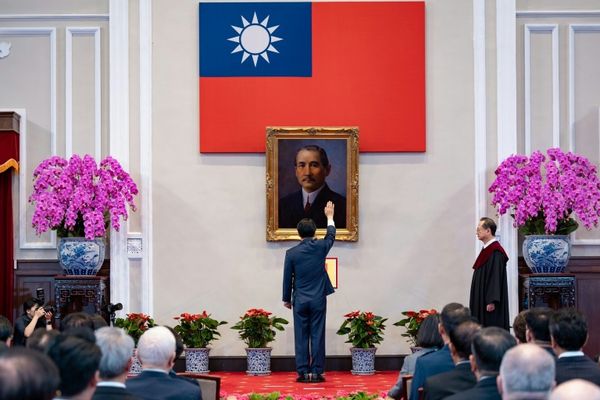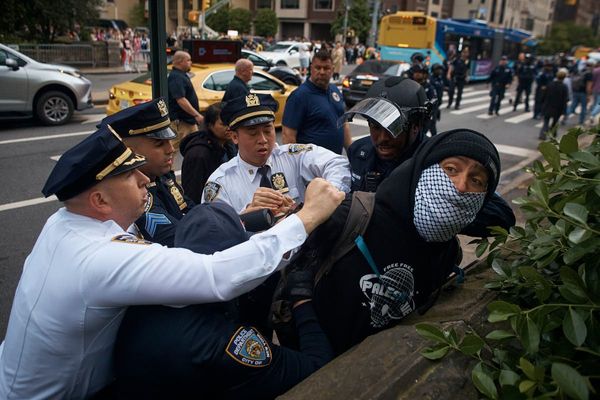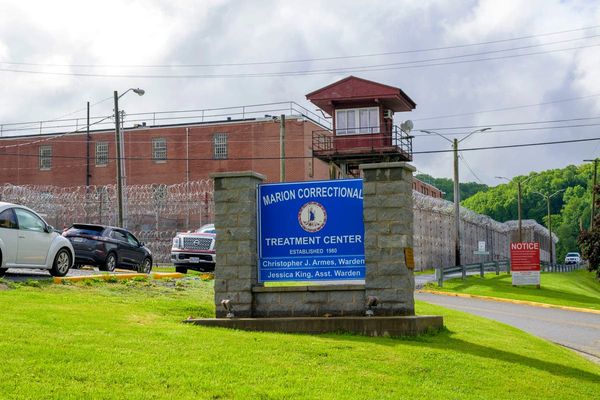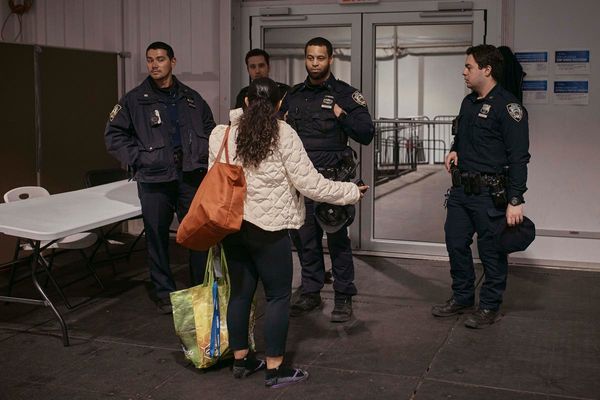“We can’t be seen with stray cattle at night,” said Mohd. Umar, while tending to his cow in Madan Mustafabad village of Hapur. “Even if they maraud our fields, we wait till morning to gently push them, including the bulls, towards our Thakur brothers in Bajheda Khurd. They have a licence to hit them hard, shove them into a vehicle and send them to the cow shelter home that has come up on the outskirts.” Sarcasm is melting in April heat as his brother Usman joins in. Tense about their cow losing fertility, he added, “Abhi nayi karai hai [artificially inseminated] but if it doesn’t work out, she won’t be of any use. You would be thinking we will eat her up,” he grinned. Some of the kin who had come home from Delhi for the harvest season said how they buried their previous cow when she died. “Don’t tell anybody, they would seal our land and get it excavated,” interrupted Usman.
The Muslim Rajput and Hindu Rajput-dominated villages hit the national headlines in 2018 when Qasim, a cattle trader, was lynched on the boundary of the two villages and self-styled cow vigilantes grievously injured a witness Md. Samayaddin. After six years, this March, a local court convicted 10 men for life and raised serious questions on police investigation in the case.
Also Read | Hapur verdict, challenging vigilantism
As the sun beats down on the wheat fields, Samayaddin is busy earning a living by harvesting wheat fields with his son and wife. It was during one such errand on June 18, 2018, that “the trouble ran into me,” he said.
Pleased that his faith in the system paid dividends, one memory that has stayed with the 66-year-old is the way the accused were welcomed by some residents of Bajheda when they initially got the bail. “We were repeatedly reminded of their political clout and how they will tire us out,” said Samayaddin, father of five daughters and two sons who took farming contracts in Bajheda before the incident. “Before the incident, there was no animosity. Still, every day scores of residents of Bajheda pass through our village but we have never given them any trouble.”
His brother Mohd. Yasin said he pleaded with the farmers in Bajheda reminding them of their long association but he was threatened. “We had no option but to stay put in the judicial battle.” Though given protection by the government, he said, they had become used to living in fear and dealing with the fractured social ties. There were better doctors in Bajheda Khurd but they avoided going there after the incident as they felt unwanted.
In Bajheda, Virendra Singh, an aged man from the Sisodia clan, who works in a beverage factory nearby, said the boys got carried away by the social atmosphere that prevailed at that time and that it was a crime that could not be condoned. “There was no evidence of cow slaughter. Either they should have planted remains of a cow at the scene or one of them should not be stupid enough to admit to the crime on camera.”
Ravinder Singh, another resident, remembered a few days after the incident came to light, a Bajrang Dal team came to felicitate the team and there was buzz in the village that it distributed some money among the boys. “When the television crew came, they would have thought it was a chance to earn more,” he said, referring to the sting operation conducted by a news channel on the main accused that was accepted as evidence by the court.
He said Samayaddin’s family had come for talks but they were humiliated and abused. “The sentiment was apni sarkar hai [it is our government]. When in the preliminary investigation it was described as an accident case, they were confident. If you so grossly cross the line, no leader can save you.”
Farmers in Bajheda admitted the village was feeling the pinch of absence of Muslim workers in their fields. “We have to call the middlemen directly and it means we have to suffer some loss. Things are changing, though and some workers have returned to work.”
‘Falsely implicated’
However, Prem Pal Sisodia, father of one of the 10 convicted men, said his son was falsely implicated. “It was a case of accident. We have no ill will against the BJP government. It is the judiciary that has faltered. How could all the 10 accused get the same quantum of punishment,” he said.
While the residents in Mustafabad want to maintain “vote ki oat [secrecy of vote]”, Mohd Javed, the cleric of the village mosque, said he didn’t see that the administration is against the community. “Recently, there were instances of boys on motorcycles shouting slogans in front of a mosque at the time of namaz. I approached the Circle Officer and he directed me to the police chowki. It took some time but the nuisance stopped. The hatred on social media has also decreased.”
Using a caste-indicative word, Md. Khalid, a farmer, said the Scheduled Castes in the village were more sensitive. “They asked us about the time of azaan when they recently took out the Ambedkar Jayanti procession. We also love the sound of DJ, it is just about a sense of accommodation,” he said.
Meanwhile, in Hapur, the BJP’s election office is being run from a small Dharamshala outside the Panchayati Gaushala run by a charitable trust since 1905. In the 36-member board, there is no Muslim member. “It is in our constitution. It unnecessarily creates problems,” said Suresh Kumar Gupta, the four-term Secretary and a member of the BJP.
On a phone call to get 100 trucks of fodder cleared from Shahjahanpur, Mr. Gupta said, “The local district magistrate felt it will spike the prices of fodder in his district. I have requested the Hapur DM for help.” He said 125 trucks of fodder were required every year to feed 2,200 bovine at the sprawling gaushala, which, according to Mr, Gupta, has an annual balance sheet of ₹5 crore.
After being a reputed contractor in the region, Mr. Gupta said the gaushala was his space to do penance. He spends the entire day in the gaushala that has facilities for making vermicompost and cow dung logs.
Mr. Gupta, said when the gaushala started getting ₹21 per cow per day from the State government the charity from the city was depleted. “The government-run cow protection centres get ₹50 per day per cow. There are around 50 such centres that have cropped up in Hapur after 2017 but they can’t match our quality of feed and care.”
‘Schemes need tweaking’
Agreeing that a political economy has evolved around cows in the State, he said there could be leakages in the system. “While the aim is noble, the schemes need tweaking. The monitoring would be stricter if the government spent on a bigger but lesser number of protection centres. The State should buy vermicompost, cow dung logs, and urine by forming an organisation like NAFED. It will incentivise protection centres to take better care of old cattle.”
He said gaurakshaks’ intervention was more posturing than love for the bovine. “For young boys working with the Bajrang Dal and the Vishwa Hindu Parishad, it is an opportunity to have a new letterhead collar khada karne ka naya bahana hai [new excuse to show influence].”
In nearby Gulaothi town of Bulandshahr, farmers say they have to catch the stray cattle themselves, arrange their own vehicle and driver to send the stray to cow shelter homes. “It is risky and costs up to ₹3,000 depending on the number of cattle and the distance of the centre. These days the panchayat secretary is quick to sign the papers but it is an unnecessary financial burden on farmers,” said Ombir Singh. Puneet Kumar said the earlier system of selling the old cattle in the animal fair is being missed. The solace, however, he said, was that “they are not being stolen from our farms and butchered in the jungle.”
Ravi Dhama who writes Gaurakshak in his WhatsApp profile has graduated to become the district vice-president of the Loni (Ghaziabad) unit of the BJP. “We no longer need to flaunt our influence. We work with the police and the Hapur case has come as a lesson. There is no point taking law in our hands.” He agreed there was no legal sanction for gaurakshaks but emphasises there is social support. “We have a job to do.” He has around 150 youngsters working with him. “Most of them are unemployed and are from families who have other earning members.”
He said the Uttar Pradesh government scheme had not been to solve the problem, particularly in underdeveloped semi-urban areas like Loni. “Cows are still feeding and choking on plastic and are starving in gaushalas in the region. ₹30-32 is not enough to keep a cow healthy. We need at least ₹150 per cow per day.”
In Aligarh, Aiman Khan, a champion debator who hails from the region, asked, if the government was serious about lynching why did National Crime Records Bureau stop collecting data on lynching and hate crime?







